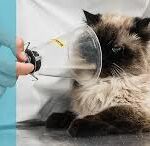Cats are not just pets; they’re cherished members of the family and responsible cat owners, ensuring the Cat Health Tips and well-being of our feline companions is paramount. From nutrition to grooming to regular veterinary care, numerous factors contribute to a cat’s overall health. In this comprehensive guide, we’ll explore a wide range of cat health tips to help you keep your furry friend in top condition.
Table of Contents
Nutrition Cat Health Tips
High-Quality Diet: Providing your cat with a balanced and nutritious diet is essential for their overall health. Choose high-quality cat food that is formulated to meet their specific nutritional needs.
Proper Feeding Schedule: Establish a consistent feeding schedule for your cat and avoid overfeeding. Portion control is crucial to prevent obesity and related health issues.
Fresh Water: Always ensure your cat has access to fresh, clean water. Hydration is key to maintaining kidney health and overall well-being.
Limit Treats: While treats can be a fun way to reward your cat, they should be given in moderation. Too many treats can contribute to weight gain and other health problems.
Grooming:

Regular Brushing: Depending on your cat’s coat length, regular brushing can help prevent mats, reduce shedding, and promote healthy skin and coat.
Nail Trimming: Keep your cat’s nails trimmed to prevent them from becoming overgrown or snagging on surfaces. Be careful not to cut them quickly, which can cause pain and bleeding.
Ear Cleaning: Check your cat’s ears regularly for signs of dirt or wax buildup. Use a damp cotton ball to gently clean the outer ear, but avoid inserting anything into the ear canal.
Cat Health Tips
Dental Care: Dental health is crucial for cats. Brush your cat’s teeth regularly with a toothbrush and toothpaste specifically designed for felines, and provide dental treats or toys to help reduce plaque and tartar buildup.
Exercise and Mental Stimulation:

Interactive Play: Engage your cat in regular interactive play sessions to provide exercise and mental stimulation. Use toys that mimic natural prey behaviour to satisfy your cat’s hunting instincts.
Scratching Posts: Cats need an outlet for their natural urge to scratch. Provide scratching posts or pads throughout your home to encourage appropriate scratching behaviour and protect your furniture.
Environmental Enrichment: Create an enriching environment for your cat with climbing structures, hiding spots, and toys to explore. Rotating toys and introducing new stimuli can help prevent boredom and behavioural issues.
Veterinary Care:
Annual Checkups: Schedule regular wellness exams with your veterinarian to monitor your cat’s health and catch any potential issues early.
Vaccinations: Keep your cat up-to-date on vaccinations to protect against common diseases and illnesses. Your veterinarian can recommend a vaccination schedule based on your cat’s lifestyle and risk factors.
Caring for cats and kittens Cat Health Tips

Parasite Prevention: Protect your cat from fleas, ticks, and internal parasites with preventative medications recommended by your veterinarian.
Spaying/Neutering: Consider spaying or neutering your cat to prevent unwanted litters and reduce the risk of certain health problems, such as reproductive cancers.
Signs of Illness:
Monitor Behavior: Pay attention to changes in your cat’s behaviour, appetite, litter box habits, and overall demeanour. These can be early indicators of underlying health issues.
Regular Checkups: Don’t wait for signs of illness to take your cat to the veterinarian. Regular checkups allow your vet to detect problems early and provide prompt treatment.
Emergency Care: Know the signs of a medical emergency in cats, such as difficulty breathing, lethargy, vomiting, diarrhea, or sudden changes in behaviour, and seek veterinary care immediately if you observe any concerning symptoms.
Conclusion:
Caring for a cat involves a commitment to their health and well-being. By following these cat health tips, you can ensure that your feline friend leads a happy, healthy life. From nutrition to grooming to veterinary care, proactive measures are key to preventing illness and maintaining your cat’s quality of life. Remember, your veterinarian is your partner in your cat’s care, so don’t hesitate to reach out if you have any questions or concerns about your cat’s health.




























































